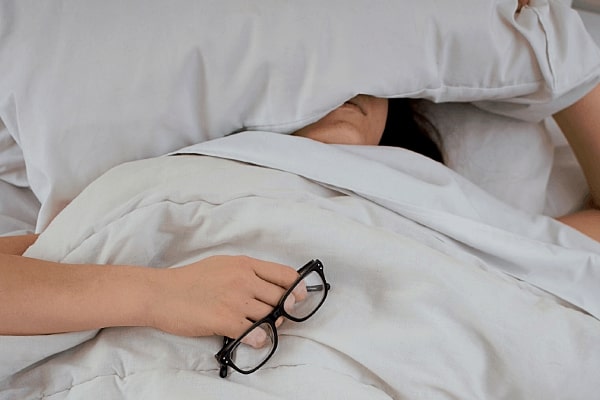For the percentage of the population tortured by the nocturnal rumblings of a partner, snoring is no joke. But Dr Asim Hasan, Practice Plus Group’s regional medical director for London, knows that the whistling, clicking, rolling thunder can tell you a great deal about a person’s health and it may also point the way to a silent night.
Read on for top snoring tips.

According to the British Snoring & Sleep Apnoea Association, 41 per cent of the UK adult population snore and many of the remaining population have to put up with the resulting noise and broken sleep. Men are twice as likely to snore as women and they tend to snore more loudly too. The level where noise starts to have an effect on sleep is around 40dB but snoring can range from about 50dB to 100+dB.
What type of snorer are you?
The key to relieving a snore is to establish what type of snorer you are. Fortunately, there are several simple tests you can do at home – all you need is a mirror and a time where people won’t be surprised or alarmed by you making strange noises and faces.
If you have been told your snoring emanates from the nose and involves snorting and wheezing, first start by trying the nostril test. Look in a mirror, press the side of one nostril to close it and, with your mouth closed, breathe in through your other nostril. If the nostril tends to collapse or close you have small or weak nostrils. Also listen for the sound of congestion and remember to test both nostrils.
If your snoring is coming from your nose, there are several things you can try. If you smoke and snore your first action should be to stop smoking. It adds to congestion and, as it is a stimulant, it can keep you awake and disrupt sleep patterns.
Keep your nose clear, so that you breathe in through your nose rather than your mouth. Nasal strip plasters that hold open the nostrils are helpful for many people with this type of snoring. Allergies are often the cause of a congested nose so, as well as finding out the cause of your allergy and trying to eliminate or restrict your exposure, you can also try antihistamine tablets or nasal sprays and over the counter decongestant sprays.
The second test is the closed mouth snore. Open your mouth and make a snoring noise, then close your mouth and try to make the same noise. If you can only snore with your mouth open then you are a ‘mouth breather’ and you need something that helps you keep your mouth closed while sleeping. Try chin straps that are designed to be placed beneath your lower lip and at the sides of your mouth, preventing your lower jaw from falling open. There are also sprays available that help this problem and your local pharmacist will be able to point you towards a suitable product.
If you can make a snoring noise only with your mouth closed, try the tongue test. Stick your tongue out as far as it will go and grip it between your teeth. Now try and make a snoring noise. If the snoring noise is reduced with your tongue in this forward position, then you are probably what is known as a ‘tongue base snorer’ – where snoring is caused by lack of tone in the tongue and surrounding tissues. Devices that position your tongue lower and further forward will help.
If your partner tells you your loud snoring is accompanied by noisy and laboured breathing and repeated short periods where your breathing is interrupted by gasping or snorting, you should make an appointment with your GP. These may be symptoms of sleep apnoea where the throat narrows or closes during sleep and repeatedly interrupts breathing. This results in a fall in the blood’s oxygen levels while the difficulty in breathing causes the brain to wake you up.
Snoring symptoms
Symptoms include fatigue, frequent trips to the toilet during the night, morning headaches and a loss of sex drive. If left untreated, the condition can increase the risks of high blood pressure, coronary heart disease, stroke and diabetes. The good news is that, with a confirmed diagnosis, effective treatments are available.
Actions to reduce snoring:
- Stop smoking. A study at Johns Hopkins University, in America, found that a quarter of smokers regularly experience disrupted sleep compared to just five per cent of non-smokers.
- Cut back on alcohol, especially before bed, as this may encourage the back of your throat to collapse as you breathe, which causes snoring.
- Keep at a healthy weight. Fatty tissue around your neck squeezes the airway and prevents air flowing in and out freely. This is why anyone with a 17 inch or greater neck size may particularly have snoring issues.
- Talk to your pharmacist for advice on sprays to clear your nose or to fight allergies. You should talk to your GP if you’re affected by an allergy which affects your nose or breathing, such as sinusitis.
- Try singing. It may seem a more unusual cure but singing can help to strengthen the muscles in the throat. These may slacken with age, which is why snoring is reported more in the over 50s.
- Sleeping on your side can be the most simple and most effective answer. Some people say sewing a golf or table tennis ball into pyjamas helps, but it seems a little extreme. Practice makes perfect and the foetal position will eventually become a habit.
- Visit the website of the British Snoring & Sleep Apnoea Association for more information and an interactive test to diagnose your snoring.

